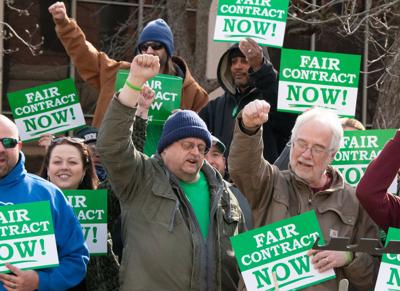The Workers' Rights Amendment will be the only statewide referendum on the ballot in Illinois.
The amendment would codify workers' right to unionize, collectively bargain and ensure workplace safety. It will take 60% of positive votes to pass.
Adam Heenan is the president of the Bloomington-Normal Trades and Labor Assembly. He spoke about why the amendment was made.
“This amendment comes out of a response of workers seeing what damage was done out of Act 10 … and seeing that there is the ability for states to take away the right for a union to organize,” Heenan said. “This would ensure that right within our state.”
Act 10 was a bill that limited public employees’ ability to collectively bargain in Wisconsin.
Todd Maisch is the president and CEO of the Illinois Chamber of Commerce. He and the chamber believe the WRA actually harms workers' rights.
"The biggest problem with the WRA is it is rewriting the constitution unnecessarily to the advantage of some workers and the disadvantage of most workers," Maisch said.
"[The name] is a misnomer, I would say borderline lie, that this is about protecting workers' right to organize and collectively bargain. That's just not right at all, it's disingenuous at best and it's a lie at worst," Maisch continued.
Maisch said that private workers' rights to unionize and collectively bargain are already protected by federal law.
Heenan said he has seen a lot of young people expressing the desire to form unions, especially after the pandemic.
“They’re asking, ‘What are my options available to make my working conditions better? What is it going to take to support my family?’ So, as a response, there is this opportunity for people to form their unions,” Heenan said.
“However, employers often hire out firms to prevent or try to influence workers to not form a union … so this seeks to remedy the balance to make sure that workers have power when they have an equitable choice," Heenan continued.
Maisch said that while union membership will not be mandatory, workers will be expected to pay union dues regardless of membership. He supports right-to-work laws instead and said they will provide increased access to business opportunities across the state.
"The real difference between right-to-work states and where Illinois is, right-to-work states cannot compel a worker to give up part of their paycheck and give it to the union," Maisch said. "With the exception of Rivian, who was given a plant for pennies on the dollar, all of the major [automobile] expansions have gone to right to work states."
If the WRA passes, Heenan said it will potentially affect Bloomington-Normal residents greatly but not through increased taxes.
“A large number of our public sector workers are already unionized,” Heenan said. “92% of our workforce in Illinois that isn’t unionized is in the private sector. So raising the safety in working conditions in the private sector doesn’t affect taxpayers in the slightest.”
Maisch also expressed concern for schools and parents as the WRA would change how teachers are able to strike. Currently, there is a mediation period before a teacher strike can begin where teachers and school administrators have to attempt to reach a compromise.
"That statute, we believe, under this amendment, is rife to be struck down," Maisch said. "That means a union could go straight from initial exchange of ideas, potentially straight to a strike with no intermediate steps. The statute that currently regulates that would be tossed out."
Heenan spoke about the importance of having a living wage and how forming unions would help that.
“We know that unionized workplaces are safer, make more money and we know that we should all be able to have a living wage,” Heenan said. “If I can support my family, then we can make sure that we have communities that are holistic and people that are civically engaged. Because then, they’re not worried about taking on two or three jobs.”
Maisch said public support for the amendment is not high enough to pass. A recent press release from the Illinois Chamber of Commerce cited a poll that showed only 54% of voters plan to vote yes for the WRA while 60% is required for it to pass.
"After the unions did all their disingenuous ads, that was kind of their high water mark. As the electorate pays more attention to what this is and what it isn't, support will continue to soften," Maisch said. "I'd say the longer this goes the worse it is for the unions and the worse it is for the prospects of the amendment."
Heenan said people should expect overall safer workplaces if the amendment passes.
“We should expect to see fewer charges of nonpayment of overtime … less harassment in the workplace and more unions forming as a result too,” Heenan said. “Unions are democracies by and for workers in the workplace. We do this in our civic life, so we should be able to do this in our working life.”


(0) entries
Sign the guestbook.
Log In
Keep it Clean. Please avoid obscene, vulgar, lewd, racist or sexually-oriented language.
PLEASE TURN OFF YOUR CAPS LOCK.
Don't Threaten. Threats of harming another person will not be tolerated.
Be Truthful. Don't knowingly lie about anyone or anything.
Be Nice. No racism, sexism or any sort of -ism that is degrading to another person.
Be Proactive. Use the 'Report' link on each comment to let us know of abusive posts.
Share with Us. We'd love to hear eyewitness accounts, the history behind an article.